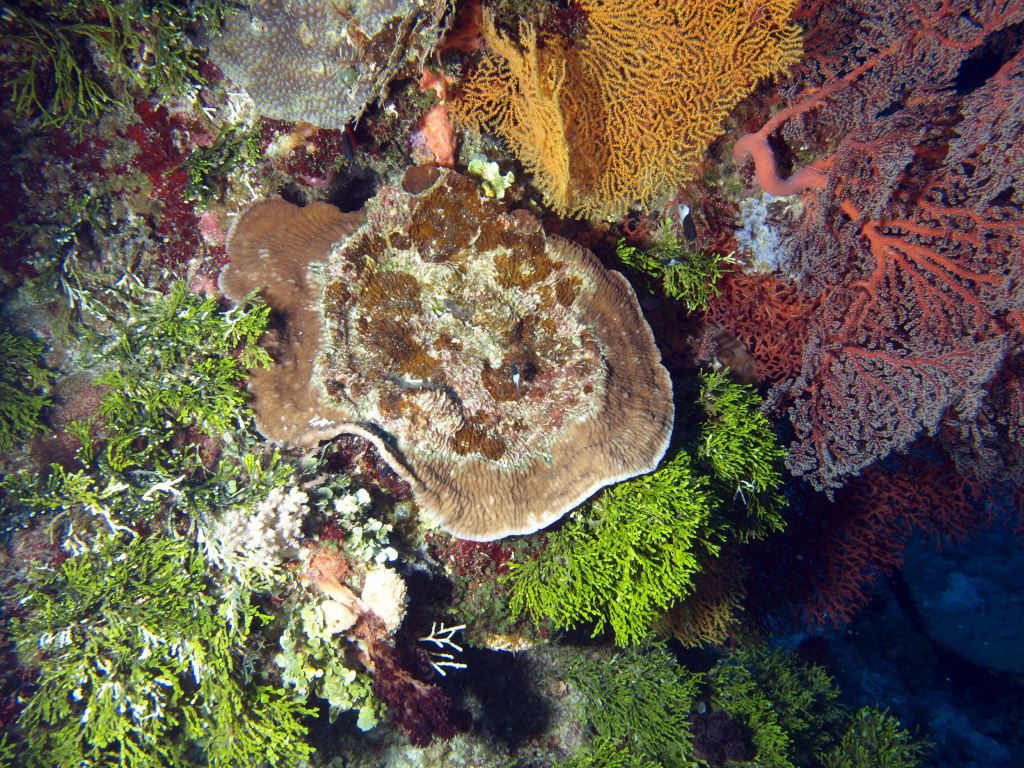|
|
Undifferentiated coral on consolidated substrate in very deep waterShort descriptionSubtidal undifferentiated mesophotic coral ecosystems on consolidated substrate in very deep water. Disclaimer: Ecosystem type descriptions are based on biophysical attributes identified in Central Queensland through expert advice and supported by scientific literature. Not all ecosystem types are mapped based on current inventory, and many of the ecosystems described here may also occur in other parts of Queensland.
Classification categoriesSelect from the links below to view related ecosystem type categories Long descriptionSubtidal undifferentiated mesophotic coral ecosystems (MCEs, i.e. low light environments) on consolidated substrate in very deep water (below 30 metres depth). These ecosystem typically occur on old shorelines and/or in deeper paleochannels. Surveys of MCEs in the central Great Barrier Reef found that ‘reefal’ substrate was the best predictor of structural macrobiota[2][3][1][6][5][7]. These consolidated substrates consisted of sediment covered limestone, or limestone substrate composition, of ridge terrain morphology, formed along the Great Barrier Reef shelf edge by shallow water coral communities during lower sea levels[2]. Dominant structural macrobiota taxa of MCEs included hard corals, octocorallians* and sponges, with wide variation in structures and groups of taxa dominating different sites, depending on differences in attributes such as Benthic depth, Terrain slope, Benthic rugosity, Water clarity and System metabolism i.e. chlorophyll. Thirteen coral families consisting of 62 genera and 195 species were reported from the northern Great Barrier Reef in waters 30 to 125 metres deep, representing 45 per cent of shallow reef species and 78 per cent of genera[6]. *Octocorallia is a subclass of the class Anthozoa in the phylum Cnidaria, and include soft corals, gorgonians, sea whips, sea pens, sea fans and octocorals. Like some of the many other anthozoans, octocorallians are sessile polyp-bearing animals with a mobile larval phase. Octocorallians are distinguished by the eight (i.e. octo) tentacles in each polyp. Most octocorallians do not deposit a rigid calcium carbonate exoskeleton, and therefore tend to attach to reefs rather than contribute to reefal frameworks as per the reef building Scleractinian (hard) corals[4]. Special valuesMesophotic ecosystems are potentially refugia from disturbance for coral species also found on shallow water ecosystems and include species tolerant to low light levels. Forty-five per cent of shallow reef coral species also occur in the mesophotic[6]. These ecosystems can provide protection from coral bleaching, however the mechanism for reduced bleaching at depth is complicated and appears to be related to Water temperature and/or light levels. In general, MCEs are also a refuge from the physical damage associated with storms and cyclones (Energy magnitude), apart from very intense ones. Coral reefs and communities (including MCEs) are highly valued for their diverse flora and fauna, fish habitat values, as commercial fisheries. The values of Queensland’s coral reefs are internationally recognised in the World Heritage Great Barrier Reef and many MCEs are found within its boundaries. The Outstanding Universal Value of the Great Barrier Reef World Heritage area is based on four criteria (vii), (viii), (ix), (x). Diagnostic attributesInundation 'Subtidal' Benthic depth 'Very deep (>30m)' Structural macrobiota 'Hard/soft coral undifferentiated' Consolidation 'Consolidated' QualifiersThe Naturalness qualifier is relevant to MCEs subject to disturbances such as anchoring and trawling. The Cover qualifier is relevant as percentage cover of branching corals is of relevance to coral ecosystem monitoring. DistributionA continuous line of submerged reefs extends along much of the shelf edge of the Great Barrier Reef in very deep waters[1]. In the central and northern Great Barrier Reef, consolidated limestone frameworks from previous shallow reef growth during earlier sea levels provided the best substrate for structural macrobiota of MCEs. The reef tops occurred at depths of 50, 55, 80, 90, 100 and 130 metres separated by flat sandy inter-reefal areas punctuated by limestone pinnacles[2][3]. There is very little data for MCEs south of Townsville due to limited surveys. Deep water corals are most likely to occur in the lower latitudes. Lower latitude waters tend to have higher light levels than higher latitudes (everything else equal) due to the angle of the light and reduced path length through the water column (P. Muir, pers. comm.). Deep water corals may also occur in shaded microhabitats at higher latitudes, which also indicates the low light tolerance of these corals[6]. The flat tops of the ridges provided the best light for corals deriving their food from photosynthesis (phototrophic) and the steep slopes and sides of the ridges were dominated by corals capable of capturing planktonic prey (heterotrophic)[3]. There were three distinct depth zones:
The following relates to distribution of this ecosystem type within the Central Queensland mapping area:
CommentsVery deep water depth is associated with low light levels (Water clarity). Other attributes include Terrain morphology, Terrain slope and Water temperature[2][5][6]. Through bathymetric multi-beam surveys of deep water north of Myrmidon Reef in the Central GBR, likely MCEs were located by analysing terrain variables of Morphology, Terrain slope etc., identifying consolidated substrates to survey for their Structural macrobiota and Benthic rugosity[2]. Energy source (current/upwelling) and Energy magnitude are also relevant[2]. Additional InformationWhat are Mesophotic Coral Ecosystems? - National Oceanic and Atmospheric Administration Mapping the life mesophotic - Marine Biodiversity Hub References
Last updated: 11 July 2019 This page should be cited as: Department of Environment, Science and Innovation, Queensland (2019) Undifferentiated coral on consolidated substrate in very deep water, WetlandInfo website, accessed 8 May 2025. Available at: https://wetlandinfo.des.qld.gov.au/wetlands/ecology/aquatic-ecosystems-natural/estuarine-marine/descriptions/91/ |

 — Department of the Environment, Tourism, Science and Innovation
— Department of the Environment, Tourism, Science and Innovation


